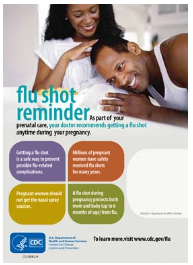Talking to Your Pregnant Patients about Vaccines
Your pregnant patients need to be vaccinated to help protect them and their babies against influenza (flu) and pertussis (whopping cough). However, many pregnant patients may not be aware of these recommendations. You are their most trusted source of health information during their pregnancies. Make sure you provide them with a strong recommendation for maternal vaccinations. Here are some tips and strategies to help you when you talk to your patients about vaccines.

This season’s flu materials include messaging to address and promote flu vaccine recommendations for pregnant women.
Other Tips to Increase Maternal Vaccination Rates in your Practice
- Administer indicated vaccines in your office if possible; if not, make a strong vaccine referral and document in the patient’s record.
- Use standing orders.
- Link timing of Tdap administration to another routine third trimester practice, like the glucose test conducted at 28 weeks.
- Use electronic medical record prompts to identify patients for which vaccines are indicated.
- Follow up with patients to ensure vaccine receipt if you do not administer vaccine in your office. Document vaccine receipt in the patient’s record.
- Remind staff to order recommended vaccines.
Present Vaccination as a Standard Part of Obstetric Care
- Provide each of your patients with information and resources about maternal vaccines when you meet with her at her first prenatal visit, and mention the timeframe for each vaccine when you discuss her pregnancy.
- Ensure your staff deliver consistent messages about the importance of maternal vaccinations (including nurses, front office staff, managers, etc.).
- Normalize vaccination as a part of patients’ pregnancy care:
- “When you come back for your next visit, it’ll be time for your Glucose Challenge Screening Test and your whooping cough vaccine.”
- “It is October and flu season is coming up. That means it’s time for your flu vaccine. Unless you need more information on flu vaccine, I’ll have the nurse bring it in.”
Provide a Strong Recommendation
- State clearly that you would like her to get vaccinated. CDC’s research indicates that some pregnant women do not feel that their ob-gyns or midwives strongly recommended vaccines.
- “I recommend a Tdap and flu vaccination for you and all of my pregnant patients, because I believe vaccines are the best way to help protect you and your baby against whooping cough and flu.”
SHARE Additional Information (as needed)
For many patients, a strong clear recommendation is enough to accept a recommended vaccine. Others may need more information.
- SHARE tailored reasons why the recommended vaccine is right for the patient because she is pregnant, which may lead to certain risk factors.
- “This vaccine can protect you from the flu, which is more likely to cause severe illness for you because changes in your immune system, heart, and lungs during pregnancy make you more prone to severe illness from flu. Also, immunity from vaccination passes into your baby, protecting your baby against flu for the first several months after birth when they are too young to get vaccinated
- “Whooping cough can be a threat to you or your baby. Since 2010, there have been tens of thousands of whooping cough cases reported each year nationwide. The whooping cough vaccine during your pregnancy will protect you and also pass some early protection against this disease on to your baby.”
- HIGHLIGHT positive experiences with vaccines (personal or in your practice) to reinforce the benefits and strengthen confidence in vaccination.
- Tell your pregnant patients that CDC, ACOG, ACNM and you recommend they get certain vaccines during their pregnancy.
- ADDRESS patient questions and any concerns about the vaccines, including side effects, safety, and vaccine effectiveness in plain and understandable language.
- “Whooping cough vaccine has been carefully studied by medical and scientific experts. Getting the vaccine during pregnancy does not put you at increased risk for pregnancy complications like low birth weight or preterm delivery.”
- “Flu shots have been given to millions of pregnant women over many years with a good safety record.
- “The most common side effects of the whooping cough and flu vaccines are mild, like redness, swelling, or pain in your arm where the shot was given. This should go away within a few days.”
- REMIND your patient that vaccines can protect her, her baby, and other loved ones from many common and serious diseases.
- “Getting the whooping cough vaccine now will not only help protect you from getting whooping cough and passing it on to your baby, but it will also pass protection on to your baby. That way, your baby will be born with some protection against this very dangerous disease.”
- “Fall and winter is the time for flu in the United States. Flu can be especially dangerous for pregnant women. That is why I want to make sure I help protect you and your baby with a flu vaccine by the end of October.”
- EXPLAIN the potential costs of getting the disease, including serious health effects, time lost (such as missing work or family obligations), and financial costs.
Questions about vaccine reimbursement and coding? See ACOG’s guide [25 pages, 7.39 MB].
Remember that patients trust you to give them the best advice on how to protect their health. To educate your pregnant patients on recommended vaccines, see these vaccination resources.
Related Pages
- Page last reviewed: October 4, 2017
- Page last updated: October 4, 2017
- Content source:


 ShareCompartir
ShareCompartir